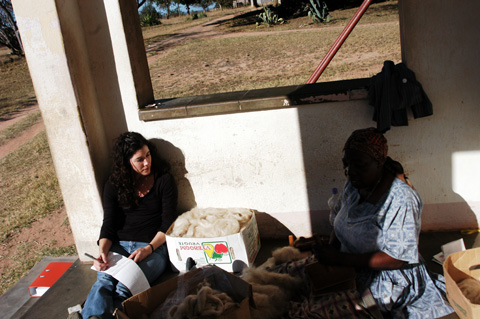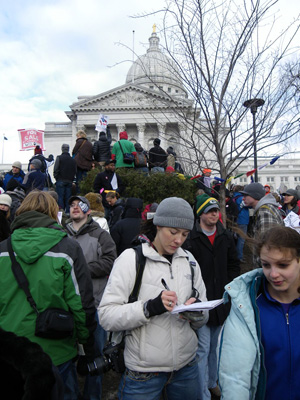
Messitt spent close to a year alongside Regina Mohlolo, a master weaver and founding member of Mapusha Weavers. Regina is one of three main characters in The Rainy Season. (2006)
“In the spring of 2003, Maggie Messitt stood in the centre of Acornhoek, South Africa—a village just over the imaginary line that once legally separated white and black—and saw a world unlike anything she had ever experienced, unlike the white community where she’d recently claimed a tent as her home, unlike the urban townships and informal settlements that graced postcards and most foreign tourist itineraries, unlike any community where she’d lived or reported before. This was rural South Africa nearly a decade after apartheid,” says the overview to her upcoming book, The Rainy Season.

Messitt reported on the Wisconsin Worker protests and recall elections throughout 2011. Her writing and photography were published in the United States and abroad, including on-the-ground-narratives for Mother Jones online and several southern African daily publications.
Messitt, a Ph.D. candidate in Creative Nonfiction within the Creative Writing program at Ohio University, earned one of two honorable mention awards in Duke University’s Center for Documentary Studies’ Documentary Essay Prize competition this summer. The Center for Documentary Studies Prize for 2013 honors the best in documentary writing, with a focus on current or recently completed work from a long-term project.
“Maggie Messitt’s essay, pulled from her forthcoming book entitled The Rainy Season, explores a rural South African community in the midst of change. The multi-threaded narrative tells the stories of three individuals ‘tackling life in the Rainbow Nation one decade after apartheid,” according to the center’s announcement. “Messitt spent eight years in rural South Africa as a freelance writer, publications editor, and director of a nonfiction storytelling project. The Rainy Season is the result of 10 months that she spent being immersed in the community and six years of reporting.
Messitt’s Ph.D. adviser is Professor Dinty W. Moore, Director of Creative Writing in the College of Arts & Sciences English Department.

Messitt reported on elephant conservation and the controversy of elephant culling for more than 18 months within greater Kruger National Park, South Africa. This image captures an elephant tracking collar replacement. (2008)
The Rainy Season invites readers into a community in the midst of change, caught between a traditional past and a western future, a racially charged history and a pseudo-democratic present. Opening a window into the beautifully complicated reality of daily life in rural Africa, The Rainy Season tells the stories of three generations, three individuals tackling life in the Rainbow Nation. This multi-threaded narrative follows a tapestry weaver in her 60s, standing at the crossroads where her faith and the AIDS pandemic meet; a middle-aged sangoma (traditional healer) taking steps to turn her shebeen (a back-door, illegal pub) into a fully-licensed tavern; and a young man taking his matriculation exams, coming of age as one of “Mandela’s children,” the first academic class educated entirely under democratic governance.
Messitt lived in Limpopo, South Africa, for most of her 20s and into her 30s, during which time she was the Founding Director of a writing school for African women, editor of a magazine and newspaper, and a freelance international correspondent. She has a passion for alternative writing classrooms and has taught in some of the most non-traditional settings: rural southern Africa, inner-city America, international newsrooms, minimum-security prisons, and a temporary refugee camp. Her most recent work has appeared in River Teeth, Memoir Journal, and the Southern Poverty Law Center’s Teaching Tolerance magazine. She is a graduate of Boston College, where she studied journalism and faith, peace and justice, and Goucher College, where she earned a Master of Fine Arts in creative nonfiction. She is currently a doctoral candidate in Creative Writing at Ohio University, where she is challenging herself to push beyond her journalism and documentary instincts and into more personal writing. She recently completed two months of field research for her latest project, a hybrid of investigation and memoir.



















One Comment